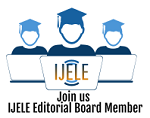(2) * M. Faruq Ubaidillah
(3) Ehsan Namaziandost
*corresponding author
AbstractIn the post-pandemic era, online learning has been the focus of many educational institutions nowadays, including English as a foreign language classes. However, with the current rapid changes in online learning, little attention has been paid to uncovering the self-reflection of pre-service English teachers in learning English online. This brief report seeks to construe how three Indonesian pre-service English teachers negotiate the meaning of their past learning experiences in English as a foreign language classes during the online learning mode. We employed a narrative inquiry in this study in order to capture the participants’ experiences. Data were garnered through WhatsApp-based semi-structured interviews and were analyzed narratively. Findings suggest that the participants negotiated their multifaceted learning experiences and complexities during the online learning process. In addition, from the participants’ narratives, teaching and learning enactment done by the teachers was ill-performed. The pedagogical implications of this study are discussed at the end of this paper.
Keywordspre-service English teacher, self-reflection, English as a foreign language, online teaching and learning
|
DOIhttps://doi.org/10.31763/ijele.v6i1.1377 |
Article metrics10.31763/ijele.v6i1.1377 Abstract views : 881 | PDF views : 251 |
Cite |
Full Text Download Download
|
References
[1] F. Agustin, D. Suherdi, and P. Purnawarman, “Effective English teachers in online EFL learning: A post-pandemic reflection on students’ perspectives,†Stud. English Lang. Educ., vol. 11, no. 1, pp. 188–204, Jan. 2024, doi: 10.24815/siele.v11i1.30124.
[2] M. Dousti and Z. Amirian, “The effect of web-mediated, blended, and purely online learning on EFL learners’ writing achievement in the Iranian context: A comparative study,†Educ. Inf. Technol., vol. 28, no. 2, pp. 1675–1696, Feb. 2023, doi: 10.1007/s10639-022-11215-0.
[3] Y. Wang, Z. Pan, and M. Wang, “The moderating effect of participation in online learning activities and perceived importance of online learning on EFL teachers’ teaching ability,†Heliyon, vol. 9, no. 3, p. e13890, Mar. 2023, doi: 10.1016/j.heliyon.2023.e13890.
[4] R. Yuan, “Chinese university EFL learners’ foreign language classroom anxiety and enjoyment in an online learning environment during the COVID-19 pandemic,†Asia Pacific J. Educ., pp. 1–17, Jan. 2023, doi: 10.1080/02188791.2023.2165036.
[5] B. Klimova, M. Pikhart, P. Polakova, M. Cerna, S. Y. Yayilgan, and S. Shaikh, “A Systematic Review on the Use of Emerging Technologies in Teaching English as an Applied Language at the University Level,†Systems, vol. 11, no. 1, p. 42, Jan. 2023, doi: 10.3390/systems11010042.
[6] J. Allen, L. Rowan, and P. Singh, “Teaching and teacher education in the time of COVID-19,†Asia-Pacific J. Teach. Educ., vol. 48, no. 3, pp. 233–236, May 2020, doi: 10.1080/1359866X.2020.1752051.
[7] T. A. Uhrich, “The Hierarchy of Reflective Practice in Physical Education: a Decision Map for Technical Reflectionâ€inâ€Action,†Reflective Pract., vol. 10, no. 4, pp. 501–512, Sep. 2009, doi: 10.1080/14623940903138365.
[8] P. Brett-MacLean and M.-T. Cave, “Text and context: involving faculty panelists as models for reflection in a film-based narrative reflective practice module in undergraduate medical education,†Reflective Pract., vol. 15, no. 4, pp. 540–549, Jul. 2014, doi: 10.1080/14623943.2014.900023.
[9] A. Finlayson, “Developing a reflective practice model for engineering leadership,†Reflective Pract., vol. 17, no. 2, pp. 87–99, Mar. 2016, doi: 10.1080/14623943.2015.1134470.
[10] J. M. GodÃnez MartÃnez, “How effective is collaborative reflective practice in enabling cognitive transformation in English language teachers?,†Reflective Pract., vol. 19, no. 4, pp. 427–446, Jul. 2018, doi: 10.1080/14623943.2018.1479688.
[11] K. Yip, “Selfâ€reflection in reflective practice: a Jaspers’ orientation,†Reflective Pract., vol. 8, no. 2, pp. 285–298, May 2007, doi: 10.1080/14623940701289485.
[12] X. Xu, “The role of self-reflection in facilitating cross-cultural adaptation as self-formation—a self-reflective diary approach,†Reflective Pract., vol. 19, no. 6, pp. 832–843, Nov. 2018, doi: 10.1080/14623943.2018.1539661.
[13] G. Gay and K. Kirkland, “Developing Cultural Critical Consciousness and Self-Reflection in Preservice Teacher Education,†Theory Pract., vol. 42, no. 3, pp. 181–187, Aug. 2003, doi: 10.1207/s15430421tip4203_3.
[14] W. A. Ong, S. Swanto, and A. Alsaqqaf, “Engaging in reflective practice via vlogs: Experience of Malaysian ESL pre-service teachers,†Indones. J. Appl. Linguist., vol. 9, no. 3, pp. 717–725, Feb. 2020, doi: 10.17509/ijal.v9i3.23222.
[15] R. Garza and S. F. Smith, “Pre-service teachers blog reflections: Illuminating their growth and development,†Cogent Educ., vol. 2, no. 1, Jul. 2015, doi: 10.1080/2331186X.2015.1066550.
[16] S. K. F. Lee and J. Loughran, “Facilitating Pre-service Teachers’ Reflection Through a School-based Teaching Programme,†Reflective Pract., vol. 1, no. 1, pp. 69–89, Feb. 2000, doi: 10.1080/713693131.
[17] K. Smith, “Learning from the past to shape the future,†Eur. J. Teach. Educ., vol. 40, no. 5, pp. 630–646, Oct. 2017, doi: 10.1080/02619768.2017.1385058.
[18] P. Kuswandono, “Mentor teachers’ voices on pre-service english teachers’ professional learning,†Indones. J. Appl. Linguist., vol. 6, no. 2, p. 213, Jan. 2017, doi: 10.17509/ijal.v6i2.4846.
[19] D. J. Clandinin, Engaging in narrative inquiry. Walnut Creek, California: Left Coast Press, Inc, 2013.
[20] T. Loughran and D. Mannay, Eds., Emotion and the researcher: sites, subjectivities, and relationships, First edition. Bingley, UK: Emerald Publishing, 2018. doi: 10.1108/S1042-3192201816
[21] T. Damianakis, B. Barrett, B. Archer-Kuhn, P. L. Samson, S. Matin, and C. Ahern, “Transformative learning in graduate education: masters of social work students’ experiences of personal and professional learning,†Stud. High. Educ., pp. 1–19, Aug. 2019, doi: 10.1080/03075079.2019.1650735.
[22] J. Isohätälä, P. Näykki, and S. Järvelä, “Cognitive and Socio-Emotional Interaction in Collaborative Learning: Exploring Fluctuations in Students’ Participation,†Scand. J. Educ. Res., pp. 1–21, Jun. 2019, doi: 10.1080/00313831.2019.1623310.
[23] T. Joosten and R. Cusatis, “Online Learning Readiness,†Am. J. Distance Educ., pp. 1–14, Feb. 2020, doi: 10.1080/08923647.2020.1726167.
[24] B. L. Moore-Adams, W. M. Jones, and J. Cohen, “Learning to teach online: a systematic review of the literature on K-12 teacher preparation for teaching online,†Distance Educ., vol. 37, no. 3, pp. 333–348, Sep. 2016, doi: 10.1080/01587919.2016.1232158.
[25] M. Opper, “Online versus offline learning,†Philos. Mag. B, vol. 77, no. 5, pp. 1531–1537, May 1998, doi: 10.1080/13642819808205045.
[26] J. Slevin, “Eâ€learning and the transformation of social interaction in higher education,†Learn. Media Technol., vol. 33, no. 2, pp. 115–126, Jun. 2008, doi: 10.1080/17439880802097659.
[27] V. Singh and A. Thurman, “How Many Ways Can We Define Online Learning? A Systematic Literature Review of Definitions of Online Learning (1988-2018),†Am. J. Distance Educ., vol. 33, no. 4, pp. 289–306, Oct. 2019, doi: 10.1080/08923647.2019.1663082.
Refbacks
- There are currently no refbacks.
Copyright (c) 2024 Langgeng Budianto, M. Faruq Ubaidillah, Ehsan Namaziandost

This work is licensed under a Creative Commons Attribution-ShareAlike 4.0 International License.

International Journal of Education and Learning
ISSNÂ 2684-9240
Published by Association for Scientific Computing Electronics and Engineering (ASCEE)
W : http://pubs2.ascee.org/index.php/ijele
E : zalik@ascee.org

This work is licensed under a Creative Commons Attribution-ShareAlike 4.0 International License.





















